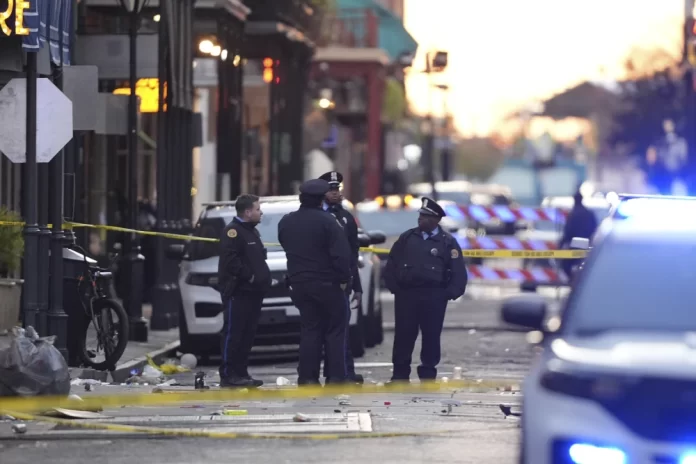Experts said the details that have emerged about Shamsud-Din Jabbar, 42, align with the typical pattern of how a veteran can be radicalized to violence.
A U.S. Army veteran from Texas who drove to Louisiana and deliberately plowed into New Year’s revelers in New Orleans recorded videos during the drive addressed to his family, in which he talked about plans to kill them before conducting the attack.
“I wanted to record this message for my family,” Shamsud-Din Jabbar said in the videos. “I wanted you to know that I joined ISIS earlier this year.”
He then added: “I don’t want you to think I spared you willingly.”
He told his family that he had first wanted to organize a “celebration” for them and make everyone “witness the killing of the apostates,” an apparent reference to killing them.
A senior law enforcement official, speaking on condition of anonymity to discuss sensitive information, confirmed to NBC News the contents of the videos, which were first reported by The New York Times. NBC News has not independently reviewed the videos.
Jabbar, 42, drove a rented truck from Houston to New Orleans on New Year’s Eve, authorities said, posting videos online along the way. Once he reached New Orleans’ famous Bourbon Street, he planted two improvised explosive devices and then got back into his truck and plowed into revelers at around 3:15 a.m., killing 14 people before police killed him in a shootout.
Experts said the details that have emerged about Jabbar align with the typical pattern of how a veteran can be radicalized to violence.
In the years leading up to Wednesday’s attack, Jabbar experienced his third divorce, accumulated significant debt and lost his corporate job. Divorce court records from January 2022 reveal he was facing business losses and credit card debt in the tens of thousands of dollars, along with more than $27,000 in overdue mortgage payments. By August of that year, his bank accounts held just $2,012, according to filings in the case.
While it may not have surprised experts, Jabbar’s rampage has bewildered his family, friends and colleagues, who described him as kind and unassuming.
“It’s a complete surprise, a shock to everyone,” Jabbar’s half brother, Abdur-Rahim Jabbar IV, 24, said in an interview this week.
It’s not clear when Jabbar first became attracted to ISIS. Abdur-Rahim Jabbar shared that their father was Muslim and Shamsud-Din Jabbar’s mother, who was Christian, converted when they married. Jabbar was open about his Muslim faith but didn’t discuss it in a forceful way.
The two rarely talked about religion, he said, though they did discuss the war in Gaza last year. Jabbar expressed being upset about the situation, calling it “genocide on both sides.”
After his most recent divorce, Jabbar seemed to become more devout, though he never discussed ISIS or any radical ideologies. His half brother described him as “trying to find himself.”
In early 2024, Jabbar posted audio messages on SoundCloud, including one titled “Satan’s Voice,” in which he condemned music as “the voice of Satan,” claiming it led people into forbidden acts like drug use and violence.
Article by Ken Delanian








